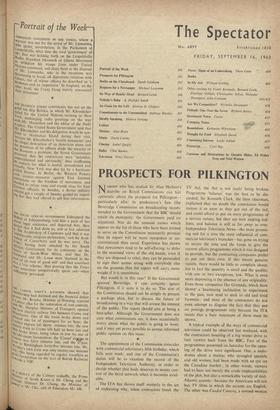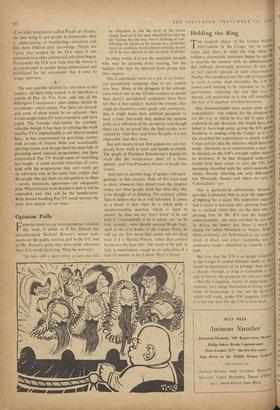PROSPECTS FOR PILKINGTON
NOBODY who has studied Sir. Alan Herbert's diatribe on Royal Commissions can feel optimistic about the prospects for Pilkington- particularly after its predecessor's fate (the Beveridge Commission on broadcasting recom- mended to the Government that the BBC should retain its monopoly; the Government paid no attention). Nor do the unusual names which appear on the list of those who have been invited to serve on the Commission necessarily promise that its report will be more outspoken or un- conventional than usual. Experience has shown • that newcomers tend to be self-effacing, to defer to the seasoned views of the old hands: even if 'they are disposed to rebel, they can be persuaded to sign their names along with everybody else on the grounds that the report will carry more - weight if it is unanimous.
But would it, in this case? If the Government ignored Beveridge, it can certainly ignore Pilkington, if it suits it to do so. The aim of the Commission should not be simply to present a package plan, but to discuss the future of broadcasting in a way that will arouse the interest of the public. The report should aim at being a best-seller. Although the Government does not care what commissions say, it does occasionally worry about what the public is going to want; and it' may yet prove possible to arouse informed public opinion on this issue.
The appointment of the Commission coincides with commercial television's fifth birthday, which falls next week; and one of the Commission's duties will be to examine the record of the Independent Television Authority, in order to decide whether that body deserves to secure con- trol of the third network when it becomes avail- able.
The 1TA has shown itself masterly in the art of explaining why, when contractors break the TV Act, the Act is not really being broken. Programme 'balance' was the first to be dis- carded; Sir Kenneth Clark, the then chairman, explained that no doubt the contractors would restore it as soon as they got out of the red, and could afford to put on more programmes of a serious nature, but they are now making mil- lions, and balance is still as far away as ever. Independent Television News—the most promis- ing and for a time the most influential of com- mercial television's branches—has gone on trying to secure the time and the funds to give the current affairs programmes which it was designed to provide; but the contracting companies prefer to put out their own. If this meant genuine variety, there would be little to complain about; but in fact the quantity is small and the quality, with one or two exceptions, low. What is even more depressing is the absence of any originality. Even those companies like Granada, which have shown' a heartening inclination to experiment in the past, now tend to stick to old and tired formuke: and most of the contractors do not even attempt to disguise the fact that they put on prestige programmes only because the 1TA insists that a bare minimum of them must be shown.
A typical example of the ways of commercial television could be observed last ,weekend, with the cbntractors boasting of a big winter drive to lure viewers back from the BBC. Two of the programmes presented on Saturday for the open- ing of the drive were significant. One, a melo- drama about a maniac who strangled spaniels and old women, had been made with an eye on the Canadian market:, in other words, viewers had to 'bear not merely the crude implausibilities of the plot, but also a remarkable variety of mid- Atlantic accents—because the Americans will not buy TV films in which the accents are English. The other was Candid Camera, a revised version of an older programme called People are Funny, the idea being to put people in humorous—that is, embarrassing or humiliating—situations and film them without their knowledge. People are Funny was stopped by the ITA when it was presented soon after commercial television began. Presumably the ITA now feels that the viewer is so conditioned to people being embarrassed and humiliated for his amusement that it need no longer intervene.
The only sensible solution for television in this country, we have long argued, is to introduce a system of Pay As You View; and one of the Pilkington Commission's chief objects should be to consider which system. For there arc several; and some of them would be no advance—they would simply make TV more expensive and more vapid. The Toronto experiment, for example, valuable though it has been in refuting the myth that Pay TV is impracticable, is not what is needed here: it has concentrated on providing viewers with re-runs of feature films and occasionally sporting events, and though there has been talk of providing more cultural programmes, few have materialised. Pay TV should aspire to something less turgid: it could provide minorities of every kind with the programmes they now rarely get on television and, at the same time, ensure that the people who put them on and perform in them ---actors, musicians, sportsmen—are adequately paid. What remains to be decided is how it will be controlled, and who will be the beneficiaries. With shrewd handling Pay TV could become the great Arts patron of our time.



































 Previous page
Previous page